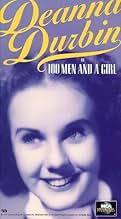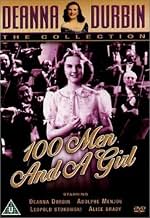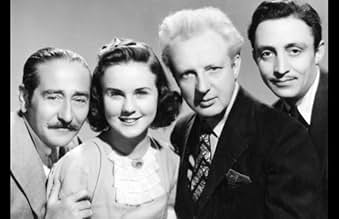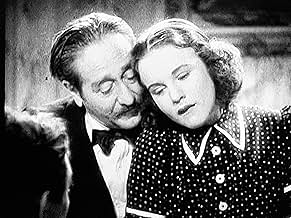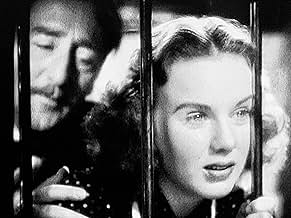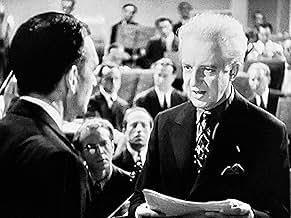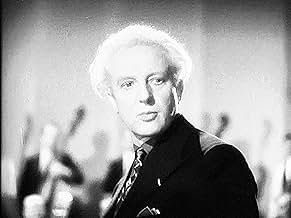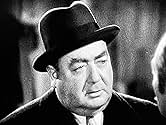Aggiungi una trama nella tua linguaThe daughter of a struggling musician forms a symphony orchestra made up of his unemployed friends and through persistence, charm and a few misunderstandings, is able to get Leopold Stokowsk... Leggi tuttoThe daughter of a struggling musician forms a symphony orchestra made up of his unemployed friends and through persistence, charm and a few misunderstandings, is able to get Leopold Stokowski to lead them in a concert that leads to a radio contract.The daughter of a struggling musician forms a symphony orchestra made up of his unemployed friends and through persistence, charm and a few misunderstandings, is able to get Leopold Stokowski to lead them in a concert that leads to a radio contract.
- Regia
- Sceneggiatura
- Star
- Vincitore di 1 Oscar
- 4 vittorie e 4 candidature totali
- Stage Doorman
- (as Jack Smart)
- Party Guest at Mrs. Frost's
- (non citato nei titoli originali)
- Adams -- Stokowski's Butler
- (non citato nei titoli originali)
Recensioni in evidenza
Ms. Durbin was a cute young girl in those years. She was wonderful in the way she projected charm without being obnoxious, or bratty. Her singing voice was amazing and it was always prominently heard in all the movies she made.
The story is something typical of those years. Director Harry Koster was able to present the material in a good fashion. The film follows Ms. Durbin in her quest to help her impoverished father and his musician friends. With the help of the rich Frosts, she is able to bring together the talented unemployed music men into forming an orchestra and convincing the great Leopold Stokowski to make music with them.
The film will not disappoint Ms. Durbin's fans. Adolph Menjou plays her father. The wonderful Alice Brady and Eugene Palette are seen as the generous Frosts, and Mischa Auer plays the family friend Michael.
"One Hundred Men and a Girl" is a wonderful family-type film to share with others. Made during the Great Depression, it gave the audience an optimistic view that those out of work would find jobs, or as the New Deal spin-doctors put it, "Prosperity is just around the corner." Patsy (Deanna Durbin) attempts to put her unemployed father John Cardwell, played to perfection by the marvelous actor Adolphe Menjou, back to work as a trombone player. She tries to convince classical director Leopold Stokowski to put her father in his orchestra but to no avail. While returning a pocketbook her father found to a wealthy society matron (Alice Brady), she misunderstands a joke as a serious proposal to offer a radio contract to her father if he can get an orchestra together composed of his out of work musician friends. The rich lady's husband John Frost is brought into the deal when his wife suddenly leaves for an extended vacation in Europe. The rest of the film revolves around Patsy getting it all together by persistence and unknowingly giving the story to the media. For viewers, it's fun all the way.
There is also an assortment of gifted character actors to add mirth and merriment to the proceedings, to name a few: Eugene Palette, Mischa Auer, and one of the funniest men in the movies Billy Gilbert. Of particular note is a hilarious performance given by Frank Jenks as a singing cab driver with a penchant for opera who appreciates Deanna's talent.
A bonus is all the fantastic classical music played by Stokowski and his orchestra. Stokowski was everyone's ideal of what a conductor should look like and sound like. Disney recognized this and put him in "Fantasia." Stokowski was largely responsible for bringing classical music from its long hair ivory tower status to make it accessible to the average American. All this plus the enchanted singing of Deanna Durbin. Who could ask for anything more?
A postscript: Keep your eye on the feather in Deanna's hat.
Set in New York City, John Caldwell (Adolphe Menjou), is seen as an unemployed musician who makes a desperate attempt confronting conductor Leopold Stokowski at Carnegie Hall for a job, but is consistently chased about by stage doorman, Marshall (J. Scott Smart), with pleas ignored by Stokowski's manager, Mr. Russell (Jameson Thomas). After being shown out the door, Caldwell acquires a lost purse on the crowded street with cash inside. Unable to locate its owner, he returns home where he uses the found money to pay off his back room rent, giving his teenage daughter, Patricia (Deanna Durbin) a indication that he's now working under Stokowski with advance in salary. In due time, however, Patricia, learning the truth, locates the identification inside the purse and does the right thing by returning it to Mrs. Frost (Alice Brady) at her luxurious home. Telling her and society guests about her father's orchestra, Mrs. Frost agrees to have her husband, John R. Frost (Eugene Palette), sponsor them on his radio program. As Caldwell organizes his orchestra in the garage, Patricia comes to the Frost home to follow up on her promise only to find that the absent-minded Mrs. Frost has gone to Europe. After locating Mr. Frost's whereabouts, she asks him for financial support, but dismisses the girl and her story as one of many practical jokes by his friend, Tommy Bitters'(Jed Prouty). With unexpected results, news reaches the media of Stokowski conducting for Caldwell's unemployed musicians, causing complications for all concerned, considering Stokowski is going on a six month concert tour in Europe.
A delightful Depression era/ fairy tale type story helped by the presence of Deanna Durbin's self confidence and energetic personality. It's hard to believe how virtually new she is to the movie business and natural she is as a performer. It's not so easy to forget Durbin's blink of her eyes that bring a happy smile to her sad-faced father (Menjou). Aside from its original screenplay by Bruce Manning, Charles Kenyon and James Mallhauser, the film is highlighted by a mix of contemporary and classic music, including "Symphony # 5, 4th Movement" by Peter Ilyich Tchiakowsky (conducted by Leopold Stokowski); "It's Raining Sunbeams" by Frederick Hollander and Sam Coslow (sung by Deanna Durbin); "The Rakoczy March" by Bezloiz; "A Heart That's Free" by Alfred G. Robyn and Thoms T. Railey; "Prelude to Act II" from Richard Wagner's "Loitengrin"); Mozart's "Allelua in 'F' Major" "Second Hungarian Rhapsody" by Franz Liszt; and "Libiamo Ne Liete Lauci" from Guiseppi Verdi's "La Traviata" (sung by Durbin). With these classical pieces, good production values and high notes, 100 MEN AND A GIRL gives the distinction of looking more like an MGM product than Universal's.
The supporting cast includes such Hollywood reliables as Mischa Auer (Michael Borodoff, a musician and close friend of the Caldwells); Billy Gilbert (The Garage Owner); Frank Jenks (The Taxi Driver); Edwin Maxwell (Ira Westling); with John Hamilton, Jack Mulhall and Charles Coleman in smaller roles. The performance given by Leopold Stokowski may provoke laughter to contemporary viewers for his wavy combed back hairstyle and mechanical way of conducting his orchestra with the use of his hands instead of a baton.
ONE HUNDRED MEN AND A GIRL earned an Academy Award nominee for Best Picture of 1937. After frequent public television revivals that took place in the 1980s, this now Durbin classic got further recognition on home video around 1994. In 1996, it had occasional revivals on American Movie Classics, and later on Turner Classic Movies where it premiered February 20, 2006. If movie does not prove satisfactory with its story, then it should for classical music lovers. (****)
Lo sapevi?
- QuizLeopold Stokowski recorded the classical music in the film at the Philadelphia Academy of Music, using the Philadelphia Orchestra (of which he was still principal guest conductor), on a multi-channel sound system, the first time one was ever used to record music in a film. The musicians seen in the film, however, were L.A.-based players doing what was called "sideline" (seen but not heard, merely miming to a prerecorded soundtrack played by others).
- BlooperThe position of Patsy's hands when she's crying on the bed.
- Citazioni
Leopold Stokowski: [Patsy has come to apologize for telling a newspaper that Stokowski would be conducting her orchestra of jobless musicians] But why did you do it? You must have had a reason.
Patricia "Patsy" Cardwell: Oh, yes! I had a hundred reasons! Would you like to hear them?
Leopold Stokowski: I certainly would.
Patricia "Patsy" Cardwell: [Goes to the door of his study and counts:] One! Two! Three! Four!
[And Stokowski suddenly hears "Hungarian Rhapsody" as clear as a bell inside his own house! He and she go out onto his balcony overlooking the entryway. The 100 men are standing on the stairway, playing]
Patricia "Patsy" Cardwell: Those are my reasons. I thought you'd like to hear them.
[Stokowski listens until the piece is nearly over, and then starts conducting with his hands]
- ConnessioniFeatured in NET Festival: Leopold Stokowski (1970)
- Colonne sonoreSymphony No. 5 in E minor: Fourth Movement
(1888)
Music by Pyotr Ilyich Tchaikovsky (as Tschaikowsky)
Played by a symphony orchestra conducted by Leopold Stokowski
I più visti
- How long is One Hundred Men and a Girl?Powered by Alexa
Dettagli
- Data di uscita
- Paese di origine
- Lingua
- Celebre anche come
- One Hundred Men and a Girl
- Luoghi delle riprese
- Azienda produttrice
- Vedi altri crediti dell’azienda su IMDbPro
Botteghino
- Budget
- 762.000 USD (previsto)
- Tempo di esecuzione1 ora 24 minuti
- Colore
- Proporzioni
- 1.37 : 1
Contribuisci a questa pagina


